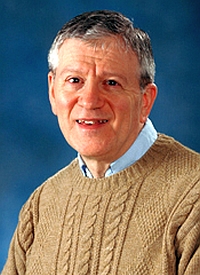Researchers at University of Maryland and Johns Hopkins University in Baltimore, National Institutes of Health, and the company SAIC reprogrammed adult stem cells to develop a test for Gaucher disease and related inherited conditions. The team’s findings appear online in the journal Proceedings of the National Academy of Sciences.
The researchers led by Maryland medical school professor Ricardo Feldman (pictured right) adapted the adult stem cell techniques developed by Shinya Yamanaka, this year’s winner of the Nobel Prize for Medicine and Physiology, taking skin cells from Gaucher disease patients and creating human induced pluripotent stem cells. The team then differentiated the stem cells into neuronal and a type of white blood cells known as macrophages.
In Gaucher disease, macrophages are unable to perform their function of digesting the lipid (oily layer) in the red blood cell membrane, thus preventing the macrophages from ingesting and eliminating damaged or aged red blood cells. The macrophages fill up with lipid and fail to clear the ingested red blood cells, blocking the membrane transport pathways in the macrophages lodged in the bone marrow, spleen, and liver.
Gaucher disease affects from 1 in 50,000 to 100,000 people, with people of Ashkenazi Jewish heritage — from Eastern and Central Europe — at the highest risk for the disease. In its various forms, the disease can cause bone disease, anemia, an enlarged liver and spleen, and neurological problems. One form, affecting infants, can lead to a rapid and early death.
Feldman’s team created macrophages from the reprogrammed stem cells from Gaucher patients, which exhibited the inability to ingest and eliminate red blood cells characteristic of the disease. The researchers then tested the stem cells by administering an engineered enzyme used to treat a mild form of Gaucher disease. When the cells were treated with the enzyme, the macrophages were able to clear the red blood cells.
“We are confident that this will allow us to test more drugs faster, more accurately and more safely,” says Feldman, “bringing us closer to new treatments for patients suffering from Gaucher disease.”
The reprogrammed stem cell technique has potential for diagnosing Parkinson’s disease. Gaucher disease is a recessive genetic disorder, which means both parents must be carriers for a child to develop the condition. Feldman notes that studies indicate people with only one copy of a mutated Gaucher gene are at an increased risk of developing Parkinson’s disease. “[A]bout 10 percent of Parkinson’s disease patients carry mutations in the recessive gene for Gaucher disease, making our research possibly significant for Parkinson’s disease as well.”
Read more:
- Leukemia Genetic Signature, Drug Candidates Identified
- Method Devised for Stem Cell Cardiac Muscle Patches
- New Process Speeds Multiple Sclerosis Treatment to Trial
- Physical Properties of Productive Stem Cells Identified
- Stem Cells Found to Protect Against Chemo Side Effects
* * *


 RSS - Posts
RSS - Posts
[…] Reprogrammed Stem Cells Help Test for Inherited Diseases […]
[…] Reprogrammed Stem Cells Help Test for Inherited Diseases […]
[…] Reprogrammed Stem Cells Help Test for Inherited Diseases […]
[…] Reprogrammed Stem Cells Help Test for Inherited Diseases […]
[…] Reprogrammed Stem Cells Help Test for Inherited Diseases […]
[…] Reprogrammed Stem Cells Help Test for Inherited Diseases […]